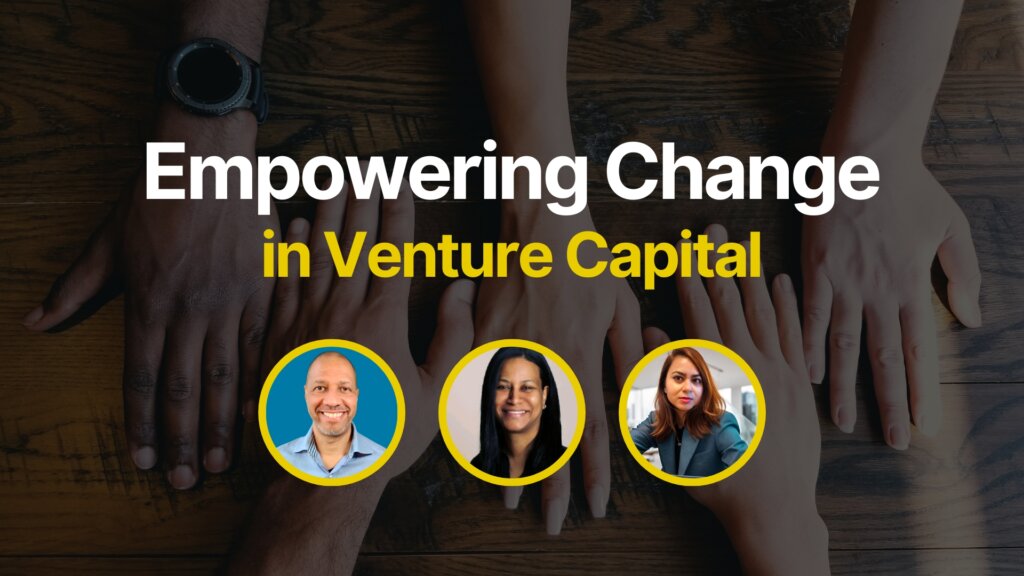Home » Empowering Change: Shaping the Future of Venture Capital through Diversity, Equity, and Inclusion
Empowering Change: Shaping the Future of Venture Capital through Diversity, Equity, and Inclusion

originally published: 2024-03-19 11:15:41
Entrepreneurs like Stephanie Lipp — who is leading the charge at MycoFutures North Atlantic by creating sustainable mycelium (root system of fungi) leather—and Azar Azad epitomize the overlooked potential stifled by systemic barriers. Azad is the founder of AI VALI, a company that enhances diagnostic accuracy and efficiency through advanced AI technology for endoscopic and medical imaging. Their experiences not only exemplify the urgency for a paradigm shift in VC funding but also highlights the rich tapestry of innovation that is at risk of being marginalized.
As per Lipp, “A lot of people just assume there’s equity, that there’s accessibility for all types of founders”, however, once she entered the startup world herself, she realized it was blatantly obvious the number of barriers that exist.
Azad agreed and mentioned how “social groups that are supporting also get tricky when it comes to standing by a startup company”.
Both realize the blurring lines in the funding decisions that affect startup founders like them. As per Lipp,
“…it does make me nervous about how we’re going to move forward with a start-up that has a really long runway, a long time to revenue, even longer time to profitability. It’s really hard in the beginning to determine if our early stage is the reason for our struggles, or if an individual with a different background would have had the opportunity to secure funding at these initial, high-risk stages.”
Bryan Duarte, founder of Black Tech Capital, and EIR at Altitude Accelerator is committed to diversity, continues to challenge the status quo, to ensure that Black and diverse tech entrepreneurs receive the recognition and funding they deserve. Emerging fund manager, Giselle Melo, also an EIR with Altitude Accelerator, and Managing Director of MATR Ventures is taking bold steps to champion underestimated founders. Melo brings her journey of overcoming adversity and her deep understanding of the systemic barriers facing underestimated founders to spearhead initiatives that level the playing field in venture capital. Her personal journey led her to found MATR Ventures:
“… if anybody knows Kobe’s [Kobe Bryant] mindset around having a mamba mentality, these are founders that have likely spent their entire lives experiencing setbacks, but just ultimately decided that success is their only option. And so that’s the reason I started MATR Ventures. I was in their shoes, at one point, experiencing [these setbacks]. But you just decide that it is not the game that you’re here to play, you’re here to win. And I figured out a way, even though I didn’t get the capital and you have setbacks and people that will judge you before a word comes out of your mouth. And the numbers sometimes speak for themselves, but they don’t even get to that point. Because as you walk in the door, they’ve made their decision.”
When discussing systemic obstacles, it’s worth noting the Kapor study highlighted a significant difference in how investors engage with founders based on their gender. The study found that male founders are often asked about growth and market opportunities, which are promotion-oriented questions. In contrast, female founders are more likely to be asked about potential risks, market fit, or loss prevention, which are prevention-oriented questions. Interestingly, those who are asked promotion-oriented questions, predominantly males, are six times more likely to secure funding than their female counterparts. How can we address and mitigate these inherent biases that currently favor males in an investment community that appears resistant to change?
Duarte asserts that we need to be more deliberate. It starts with recognizing your own biases,
“I recognize my own privilege. I recognize my privilege as a male. I recognize my privilege as growing up very much in white spaces. So, I’m going to use that privilege to try to break down those barriers and go in.”
He also points out that we need to scrutinize and challenge the numbers,
“In the Canada there are two key areas we need to focus on for change. The first is the Business Development Bank of Canada (BDC). They have recently released studies through Diversio that require anyone they invest in, or any funds they invest into, to disclose their diversity statistics. As a government organization, it’s crucial that we, the public, apply pressure to ensure these numbers are transparent and accessible. However, their recent reports are too generalized, particularly when it comes to minority groups. Instead of lumping all minority groups together, the data should be broken down to show specific numbers for Black, Indigenous, and Latino communities. This will give us a clearer picture of the actual representation.
Duarte points we need to get down to the “nitty gritty numbers”. Funds like Black Tech Capital, MATR Ventures are focused on overcoming these biases and will be the ones to challenge these numbers. He contends, “… it’s a process, it’s a long game, it’s not a short term. This is not going to change overnight.”
Together, Duarte and Melo are not just fund managers, they are advocates for change, leveraging their personal experiences and leadership to dismantle longstanding barriers in venture capital funding towards a more equitable and innovative startup landscape.
Altitude Accelerator
https://altitudeaccelerator.ca/
Altitude Accelerator is a not-for-profit innovation hub and business incubator for Brampton, Mississauga, Caledon, and other communities in Southern Ontario. Altitude Accelerators’ focus is to be a dynamic catalyst for tech companies. We help our companies grow faster and stronger. Our strength is our proven ability to foster growth for companies in Advanced Manufacturing, Internet of Things, Hardware & Software, Cleantech and Life Sciences. Our team consists of more than 100 expert advisors, industry, academic, government partners. The team helps companies in Advanced Manufacturing, Internet of Things, Hardware & Software, Cleantech and Life Sciences to commercialize their products and get them to market faster.


